That Hoarder: Overcome Compulsive Hoarding
Hoarding disorder is stigmatised and people who hoard feel vast amounts of shame. This podcast began life as an audio diary, an anonymous outlet for somebody with this weird condition. That Hoarder speaks about her experiences living with compulsive hoarding, she interviews therapists, academics, researchers, children of hoarders, professional organisers and influencers, and she shares insight and tips for others with the problem. Listened to by people who hoard as well as those who love them and those who work with them, Overcome Compulsive Hoarding with That Hoarder aims to shatter the stigma, share the truth and speak openly and honestly to improve lives.
Episodes
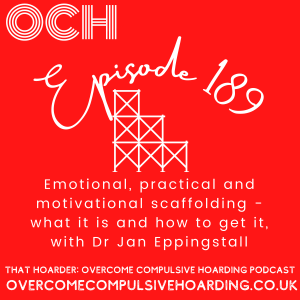
Friday Jun 06, 2025
Friday Jun 06, 2025
Come to a Dehoarding Accountability Zoom Session: http://www.overcomecompulsivehoarding.co.uk/ticket
Subscribe to the podcast: https://www.overcomecompulsivehoarding.co.uk/subscribe
Podcast show notes, links and transcript: http://www.overcomecompulsivehoarding.co.uk/
This week I’m joined by Dr Jan Eppingstall to talk about scaffolding - what it means, how it helps with hoarding recovery, and why our needs for support change over time.
We break down practical, emotional, and motivational scaffolding, from therapy and peer support to self-made systems and the way we talk to ourselves.
If you’ve ever wondered how to find the right kind of help without feeling stuck with it forever, this is the episode for you.
Buy your copy of Everything You Need to Know About Hoarding by Dr Lynne Drummond at cambridge.org/EverythingHoarding, and get 20% off with the discount code HOARDING20. #ad
Explanation of Scaffolding and the Zone of Proximal Development
Definition of scaffolding from educational psychology.
Origins in Lev Vygotsky’s work: helping people accomplish tasks with support.
Relevance to hoarding and recovery.
Application of Scaffolding to Hoarding Recovery
Psychological, cognitive, and emotional elements in hoarding.
Physical and organisational skill deficits in people who hoard.
Differences and interplay between psychological barriers and practical skills.
Illustrating support levels: from high assistance to independence.
Personal examples demonstrating that support needs can resurface over time.
The Changing Nature of Scaffolding
Scaffolding shifts in form and amount as people progress or encounter setbacks.
Individualisation: What’s supportive for one may not be for another.
Types of Scaffolding for Hoarding Recovery
External supports: therapists, peers, coaches.
Direct instruction and physical assistance.
Environmental modifications.
Tools and resources.
Social encouragement and accountability.
Assessing current functioning.
Matching support to challenge level (not too easy, not too hard).
Gradually reducing support as independence grows.
Scaffolding for Neurodivergent Individuals
Adjustments for ADHD:
Shorter work periods, built-in breaks.
Accountability partners and visual reminders/checklists.
Adjustments for Autism:
Predictable routines.
Clear rules and decision trees.
Sensory-friendly environments.
Executive Function Challenges and Tailored Scaffolding
Strategies like breaking down decisions, using templates, "parking lot" systems for deferred decisions.
Recognising that executive function can be context-specific and fluctuate.
Importance of Emotional Scaffolding
Emotional regulation during dehoarding.
Need for self-soothing and distress-tolerance skills as support is reduced.
Informal and Internal Scaffolding
Peer support, self-talk, problem solving, reminders.
Adapting systems in the home as a supportive structure.
Habituation and Evolvement of Support Systems
Reminder fatigue and strategies to combat it (rotating formats, colours, locations).
The necessity for systems to evolve as needs and effectiveness change.
Mindset Shifts and Realistic Expectations
Acceptance that supports may need to be re-engaged during crises or setbacks.
Not viewing return to scaffolding as failure - progress and healing aren’t linear.
Testing assumptions about personal limitations.
Re-evaluating and Customising Support
Creating, testing, and modifying practical systems in the home with or without outside perspective.
Recognising the value of trying new strategies even if initial skepticism exists.
Links
Zone of Proximal Development
The Metaphor of Scaffolding: Its Utility for the Field of Learning Disabilities, Stone, C. Addison, Journal of Learning Disabilities, 0022-2194, July 1, 1998, Vol. 31, Issue 4
Podcast ep 183: ADHD, executive dysfunction and creating hacks and systems to reduce clutter chaos, with Carrie Lagerstedt
Money Love podcast
Podcast ep 127: Overcoming overspending with Paige Pritchard, Money Coach
Come to a Dehoarding Accountability Zoom session: Accountability Booking Form
Dr Jan Eppingstall at Stuffology
https://www.facebook.com/stuffologyconsulting/
https://twitter.com/stuff_ology
https://www.instagram.com/stuff_ology/
Dr Jan Eppingstall on Pinterest
Website: Overcome Compulsive Hoarding
Become a Dehoarding Darling
Submit a topic for the podcast to cover
Questions to ask when dehoarding: https://www.overcomecompulsivehoarding.co.uk/podquestions
Instagram: @thathoarderpodcast
Twitter: @ThatHoarder
Mastodon: @ThatHoarder@mastodon.online
TikTok: @thathoarderpodcast
Facebook: Overcome Compulsive Hoarding with That Hoarder
Pinterest: That Hoarder
YouTube: Overcome Compulsive Hoarding with That Hoarder
Reddit: Overcome Compulsive Hoarding with That Hoarder subreddit
Help out: Support this project
Sponsor the podcast
Subscribe to the podcast
Subscribe to the podcast here
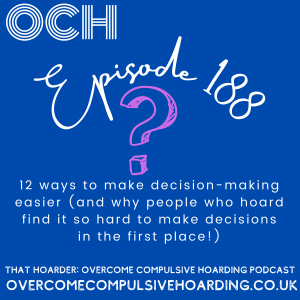
Friday May 30, 2025
Friday May 30, 2025
Come to a Dehoarding Accountability Zoom Session: http://www.overcomecompulsivehoarding.co.uk/ticket
Subscribe to the podcast: https://www.overcomecompulsivehoarding.co.uk/subscribe
Podcast show notes, links and transcript: http://www.overcomecompulsivehoarding.co.uk/
Decision-making can be a huge stumbling block when you’re trying to tackle hoarding, from cognitive overload to perfectionism and decision fatigue. In this episode, I unpack why making choices about our belongings feels so overwhelming, what can go wrong if we avoid it, and I share practical strategies to make the process more manageable. If you find yourself stuck in analysis paralysis or endlessly putting off decisions, this one’s for you.
Buy your copy of Everything You Need to Know About Hoarding by Dr Lynne Drummond at cambridge.org/EverythingHoarding, and get 20% off with the discount code HOARDING20. #ad
Introduction to Decision Making and Hoarding
Decision making as a common issue among hoarders
Overwhelm and avoidance connected to belongings and acquiring new items
Episode aims: understanding why decision making is hard, consequences of indecision, and strategies to help
Why Decision Making is Difficult for People Who Hoard
Cognitive Overload
Too many items to process, making each choice feel monumental
Resulting in avoidance and deferral of decisions
Accumulation due to unresolved decisions
Analysis Paralysis
Being stuck analysing endless options and outcomes
Difficulty prioritising and overthinking decisions
Exhaustion from mental effort
Information Processing Challenges
Trouble prioritising urgency and importance
Struggling to filter necessary versus unnecessary information
Being trapped in unresolvable decision loops
Emotional Barriers
Perfectionism and fear of making the wrong decision
Catastrophising possible negative outcomes
All-or-nothing thinking relating to perfectionism
Sentimental Attachment
Struggles with emotional connection to items (gifts, memories)
Difficulty discerning genuine sentimental value
Fear of the Future
Anxiety about future need or regret causing paralysis
Preference for clinging to items over risking discomfort
Executive Function Challenges
Difficulties with planning, organising, prioritising, and initiating tasks
Impact of poor working memory on decision making
Consequences of Avoiding Decisions
Vicious Cycle of Procrastination
Accumulation of clutter, increased overwhelm and fatigue
Practical Implications
Safety hazards and restricted home usage
Social isolation and relationship strain due to inability to host
Emotional Impact
Stress, depression, guilt, and shame
Financial Consequences
Extra spending, buying duplicates, damage or loss of items, missed bills and penalties
Building Negative Self-Perceptions
Belief in inability to decide reinforces avoidance
Declining self-trust and self-esteem
Strategies and Techniques for Improving Decision Making
Identify Resistance and Mental Blocks
Questioning internal "nope" responses
Understanding fears or overwhelming factors behind avoidance
Treat Decisions as Experiments
Lowering pressure by seeing outcomes as learning experiences
Avoiding a pass/fail mindset
Make Micro-Decisions
Starting with low-stakes, emotionally neutral items
Building decision-making confidence ("decision muscle")
Utilise Support Systems
Seeking feedback or accountability from friends, family, organisers, or therapists
Sense-checking and encouragement from others
Clarify Values and Priorities
Aligning decisions with personal goals (e.g., hospitality, functionality, beauty)
Using values as a decision compass
Set Time Limits
Imposing limits per decision to prevent overthinking
Adjusting duration as confidence improves
Accept “Good Enough” Decisions
Allowing for adequacy over perfection
Challenging double standards around self-expectations versus others
Reduce Number of Choices
Limiting possible options (e.g., keep/throw/donate)
Pre-determining criteria to streamline choices
Reality Checks
Probing feelings of “I might need it” with practical questions
Reviewing usage frequency and functionality
Increase Awareness of Avoidance
Noticing procrastination and avoidance behaviours
Evaluating the significance of indecision as a barrier
Build Tolerance for Uncertainty and Discomfort
Accepting that discomfort is part of life, and not deciding brings other difficulties
Gradually practicing sitting with uncertainty
Practice Consistency in Decision Making
Incorporating daily decision-making habits
Gently challenging avoidance and celebrating each choice made
Decision-making is a learnable, improvable skill
The importance of starting small and practicing imperfect decisions
Building self-trust and confidence through repeated practice
Encouragement to challenge avoidance and recognise growth with each decision
Links
Buy your copy of Everything You Need to Know About Hoarding by Dr Lynne Drummond at cambridge.org/EverythingHoarding, and get 20% off with the discount code HOARDING20.
Podcast ep 172: Harriet Impey on clearing out her parents’ very full home, through family belongings and personal growth, in the film Where Dragons Live
Podcast ep 186: 10 executive dysfunction tips and tricks to help people who hoard, whether we have ADHD or are neurodivergent or not – Hoarding Awareness Week 2025
Podcast ep 183: ADHD, executive dysfunction and creating hacks and systems to reduce clutter chaos, with Carrie Lagerstedt
Podcast ep 162: From Fibble to Focus: Defibble your executive dysfunction with Jo Cavalot
Podcast ep 112: Executive function, executive dysfunction and hoarding with Dr Jan Eppingstall
Podcast ep 149: ADHD, hoarding and clutter with Susie Boutal, ADHD and Declutter Coach
Podcast ep 107: Things that look like hoarding but aren’t: ADHD, depression, autism, OCD, OCPD and more
Podcast ep 40: ADHD and hoarding with Dr Sharon Morein
Podcast ep 182: What are “towards and away moves” and what on earth do they have to do with hoarding recovery? With Dr Jan Eppingstall
Podcast ep 28: Avoid analysis paralysis by having ‘systems’
Podcast ep 49: Sitting with discomfort: distress tolerance and hoarding – How unconscious distress avoidance might be worsening your problems
Reasons to be Cheerful with Ed Miliband
Come to a Dehoarding Accountability Zoom session: Accountability Booking Form
Website: Overcome Compulsive Hoarding
Become a Dehoarding Darling
Submit a topic for the podcast to cover
Questions to ask when dehoarding: https://www.overcomecompulsivehoarding.co.uk/podquestions
Instagram: @thathoarderpodcast
Twitter: @ThatHoarder
Mastodon: @ThatHoarder@mastodon.online
TikTok: @thathoarderpodcast
Facebook: Overcome Compulsive Hoarding with That Hoarder
Pinterest: That Hoarder
YouTube: Overcome Compulsive Hoarding with That Hoarder
Reddit: Overcome Compulsive Hoarding with That Hoarder subreddit
Help out: Support this project
Sponsor the podcast
Subscribe to the podcast
Subscribe to the podcast here
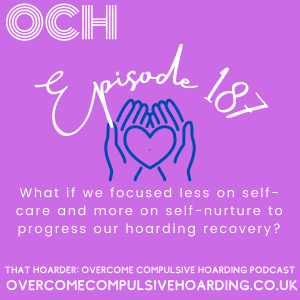
Friday May 23, 2025
Friday May 23, 2025
Come to a Dehoarding Accountability Zoom Session: http://www.overcomecompulsivehoarding.co.uk/ticket
Subscribe to the podcast: https://www.overcomecompulsivehoarding.co.uk/subscribe
Podcast show notes, links and transcript: http://www.overcomecompulsivehoarding.co.uk/
Self-care gets a lot of airtime these days, but I’ve started rethinking what it actually means, especially when you’re struggling with hoarding disorder. In this episode, I talk about why marketed, consumer-driven “self-care” just adds more pressure, and why nurturing yourself with compassion, connection, and practical routines is far more effective. Plus, I share some genuinely helpful, low-cost ways to support yourself without adding to the clutter - or your to-do list.
Self-Care in Modern Times
Evolution of the meaning of “self-care”:
The older, practical definition (basic hygiene, nourishment)
Current consumer-driven, extravagant interpretations
Critique of modern self-care commercialisation
Challenges of Hoarding and Mental Health Struggles
Emotional toll of hoarding disorder
Stress, anxiety, depression, trauma, grief
The exhausting process of trying to “fix” things
Daily stressors of living in a hoard
Feelings of failure, constant reminders, adrenaline spikes from unexpected visitors, tripping over items
The Real Purpose of Self-Care
Balancing negative emotions (stress, grief, trauma) with activities that nurture the soul
Evaluating popular self-care advice
The problem with universal, commercialised recommendations
Importance of individualised, inward-looking approaches
Introducing the Concept of "Self-Nurture"
How self-nurture differs from self-care
Greater compassion, sustainability, and personalisation
Emphasis on looking inwards for individual needs
Practical examples of self-nurturing activities
The Pitfalls of Commercialised Self-Care
The “shoulds” culture and guilt surrounding unmet self-care standards
Surface-level versus meaningful acts of care
How marketed solutions often do not address real needs
Guilt and shame when unable to practice recommended self-care (especially for those who hoard)
Consumer Culture and Self-Care
Self-care as a commodified experience: Encouragement to buy unnecessary products
How this affects people who hoard
Risk of exacerbating clutter by acquiring more as “self-care”
Focus on external fixes rather than internal wellbeing
The Benefits of Self-Nurture
Self-nurture as inexpensive or free
Focus on activities rather than acquisitions
Finding joy or restoration in simple practices (e.g., using what you have, accessing the library, running without specialised gear)
Compassionate Self-Nurture in Practice
Asking internal questions about core needs (physical, emotional, psychological)
Treating oneself as one would treat a person they love
Emphasis on gentle, non-critical, incremental progress
Drinking water for wellbeing rather than obligation
Time in nature, connecting with friends, creativity, self-acceptance
Building Emotional Security and Gentleness
Establishing emotional security as a core need
Managing self-criticism and reaching out for connection despite anxiety
Celebration of small wins and progress
Validating and acknowledging difficult feelings with compassion
Evaluating and Choosing Nurturing Activities
Key questions to ask: “Will this nurture me emotionally, psychologically, or physically?”
Differentiating between genuine needs and justifying unnecessary purchases
Avoidance of reinforcing negative patterns through acquisition
Developing a Personal Toolbox for Self-Nurture
Gathering and customising strategies that work
Routines and coping mechanisms
Taking stock of helpful techniques, personalising approaches
Recognising and valuing unique sources of restoration
Top Tip
DIY, low-cost tip for cleaning the dishwasher with household items
Encouragement to take any step, however small, towards self-nurture
Links
The "feeling your feelings" episode
Episodes talking about the inner critic: with Steve Chapman; about the song that changed everything for me; and about making mistakes
Come to a Dehoarding Accountability Zoom session: Accountability Booking Form
Website: Overcome Compulsive Hoarding
Become a Dehoarding Darling
Submit a topic for the podcast to cover
Questions to ask when dehoarding: https://www.overcomecompulsivehoarding.co.uk/podquestions
Instagram: @thathoarderpodcast
Twitter: @ThatHoarder
Mastodon: @ThatHoarder@mastodon.online
TikTok: @thathoarderpodcast
Facebook: Overcome Compulsive Hoarding with That Hoarder
Pinterest: That Hoarder
YouTube: Overcome Compulsive Hoarding with That Hoarder
Reddit: Overcome Compulsive Hoarding with That Hoarder subreddit
Help out: Support this project
Sponsor the podcast
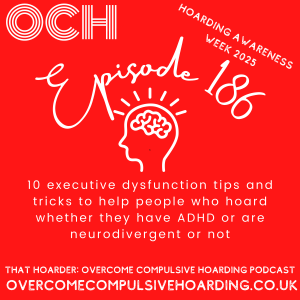
Friday May 16, 2025
Friday May 16, 2025
Come to a Dehoarding Accountability Zoom Session: http://www.overcomecompulsivehoarding.co.uk/ticket
Subscribe to the podcast: https://www.overcomecompulsivehoarding.co.uk/subscribe
Podcast show notes, links and transcript: http://www.overcomecompulsivehoarding.co.uk/
For Hoarding Awareness Week 2025, I’m focusing on executive function - the brain’s control centre for planning, starting, and finishing tasks - and the small, practical hacks that can make a genuine difference for people who hoard, whether or not we have ADHD or are neurodivergent. I talk about real-life tips for breaking the overwhelm, managing perfectionism, building momentum, and overcoming shame, all with the aim of making progress sustainable and achievable in your day-to-day life. This episode is all about honest advice that actually works, whether you’re in the thick of it or just looking for a few smarter ways to approach this.
Hoarding Awareness Week 2025 and its theme: Hoarding & Executive Function
Recognition that executive function challenges impact both neurodivergent and neurotypical people
Executive Function and Hoarding
Previous podcast episodes relating to executive function, ADHD, and hoarding
Importance of using effective hacks and techniques, regardless of neurotype
Emphasis on finding what works personally for each listener
The Realities and Challenges of Tackling Hoarding
Overwhelm and daunting feelings about dehoarding
Breaking tasks into small, manageable parts
Focus on actionable, day-to-day strategies rather than long-term, rigid planning
Understanding Executive Function
Explanation of what executive function is (control centre for planning, focus, and impulse control)
Factors that can impair executive function (neurodivergence, mental health, stress, lack of sleep, etc.)
Universality of executive dysfunction - everyone struggles at times
Emotional Barriers: Perfectionism and Shame
The cycle of shame and self-blame in executive dysfunction and hoarding
Societal judgment around hoarding, and its paralysing effects
Strategies for stepping back, naming emotions, and cultivating self-compassion
Core Executive Dysfunction Tips and Hacks
Breaking Tasks Down
Setting realistic micro-goals
The concept of “towards” vs. “away” moves in progress
Tracking Progress
Counting bags/items leaving the house
Caution against tracking becoming burdensome for some
Using Timers
Setting short (e.g., 5-minute) timers to help with task initiation
Use of voice assistants to avoid distraction
Reverse-timer technique to use end of music/podcast as a cue for action
The Two-Minute Rule
Limitations and personal adaptations of rule
Identifying Motivations
Creating visual or written reminders of why you want to dehoard
Acceptance of some tools working only temporarily, and switching when necessary
Reward Systems
Small, non-material rewards for completing tasks
Linking listening to desired media (like the podcast) with decluttering activities
Non-Negotiable Rules
Creating routines to reduce decision fatigue (e.g., charity bags leave home immediately)
Body Doubling
Doing tasks alongside others (physically or virtually, like in the host’s Zoom sessions)
Emotional/moral support of parallel accountability
Alternative ways to body double if group support isn’t accessible
Time Blocking and Scheduling
Using calendars and reminders to schedule decluttering sessions
Flexibly adapting this strategy based on personal response
Habit Stacking
Linking a new task to an established routine (e.g., unloading dishwasher while kettle boils)
Using “add-ons” for frequently-visited spaces (e.g., clearing five things each time you enter the bathroom)
Links
Podcast ep 183: ADHD, executive dysfunction and creating hacks and systems to reduce clutter chaos, with Carrie Lagerstedt
Podcast ep 162: From Fibble to Focus: Defibble your executive dysfunction with Jo Cavalot
Podcast ep 112: Executive function, executive dysfunction and hoarding with Dr Jan Eppingstall
Podcast ep 149: ADHD, hoarding and clutter with Susie Boutal, ADHD and Declutter Coach
Podcast ep 107: Things that look like hoarding but aren’t: ADHD, depression, autism, OCD, OCPD and more
Podcast ep 40: ADHD and hoarding with Dr Sharon Morein
Podcast ep 82: Dehoarding when you’re drowning with KC Davis of Struggle Care
Podcast ep 182: What are “towards and away moves” and what on earth do they have to do with hoarding recovery? With Dr Jan Eppingstall
Podcast ep 184: What if we actually felt the feelings? An honest conversation about trauma, hoarding, and allowing yourself to feel
Podcast ep 28: Avoid analysis paralysis by having ‘systems’
Arielle and Ned's Daily Tips That May or May Not Help You
Come to a Dehoarding Accountability Zoom session: Accountability Booking Form
Website: Overcome Compulsive Hoarding
Become a Dehoarding Darling
Submit a topic for the podcast to cover
Questions to ask when dehoarding: https://www.overcomecompulsivehoarding.co.uk/podquestions
Instagram: @thathoarderpodcast
Twitter: @ThatHoarder
Mastodon: @ThatHoarder@mastodon.online
TikTok: @thathoarderpodcast
Facebook: Overcome Compulsive Hoarding with That Hoarder
Pinterest: That Hoarder
YouTube: Overcome Compulsive Hoarding with That Hoarder
Reddit: Overcome Compulsive Hoarding with That Hoarder subreddit
Help out: Support this project
Sponsor the podcast
Subscribe to the podcast
Subscribe to the podcast here
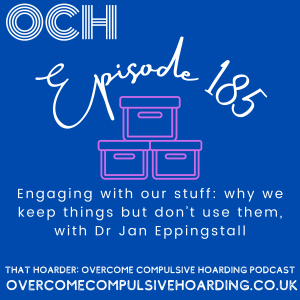
Friday May 09, 2025
Friday May 09, 2025
Come to a Dehoarding Accountability Zoom Session: http://www.overcomecompulsivehoarding.co.uk/ticket
Subscribe to the podcast: https://www.overcomecompulsivehoarding.co.uk/subscribe
Podcast show notes, links and transcript: http://www.overcomecompulsivehoarding.co.uk/
In this episode, I’m with Dr Jan Eppingstall, a Melbourne-based counsellor and hoarding expert extraordinaire. We unpack the concept of engaging with our belongings - actually seeing, touching, and using the things we tend to accumulate, rather than letting them fade into the background. Jan shares insights from her work, explains why we often feel safer just owning stuff instead of interacting with it, and offers practical ways to build a healthier, more intentional relationship with what we own. There are some genuinely enlightening moments, and plenty of ideas for anyone looking to break free from an excess of stuff.
Defining "Engaging with Our Stuff"
What it means to actually engage with possessions (seeing, touching, using)
Comparison to possessions fading into the background
The idea of using versus just possessing objects
Patterns of Engagement Among People Who Hoard
Sense of safety from being surrounded by possessions without interaction
Only the "top layer" of possessions typically being used
Loss of intention behind keeping sentimental or useful items
The psychological comfort of having versus using objects
Emotional and Psychological Aspects of Compulsive Hoarding
Emotional connection to the potential of objects rather than actual objects
Avoidance of decision-making by not engaging/touching items
Security and reassurance derived from the mere presence of items
Defeatism and pointlessness associated with searching for or using objects
Barriers to Engaging with Possessions
Overwhelm from the sheer volume of stuff
Active resistance and avoidance behaviours
Feelings of incompetence and adaptation through purchasing duplicates
Guilt associated with over-accumulation
Benefits of Actively Engaging with Possessions
Rediscovering useful or wanted items when sorting
Increased awareness of what is owned and where it is
Neurological and psychological benefits of tactile interaction
Insights gained from using and trying on items (e.g., clothing)
Decision-making as a muscle that strengthens with practice
Realisations about unnecessary duplicates (e.g., multiple ladles in the kitchen)
Emotional and practical hurdles in finding homes for items
Perfectionism and rigidity around item placement and organisation
Moving, Arranging, and Re-organising Possessions
Resistance to moving items from "their place" due to tradition, attachment, or perfectionism
Fear of forgetting where things are if organisational changes are made
Multi-step decision fatigue when organising
The importance of flexible, evolving systems for item placement
Confronting Avoidance and Overwhelm
The value of small steps, e.g., simply looking into an avoided bag or space
The myth of a “good reason” for keeping certain items, often dispelled when items are revisited
Developing Healthier, More Intentional Relationships with Stuff
Introducing intention and ritual to everyday interactions with possessions
“Rotation stations” and seasonal evaluation/rituals
Benefits of conscious handling, organisation, and maintenance
Cultural Perspectives and Practices
Japanese concepts:
Te Ate: hand-care, tactile connection as a ritual
Mushiboshi: seasonal airing and assessment of items
Ma: meaningful emptiness/space as a source of tranquillity
Contrasts between Western consumerism and other cultural approaches to possessions
Challenges and Solutions in Organising and Letting Go
The impact of spatial processing or organisational difficulties
Accepting that resistance to change is sometimes due to overwhelm
Personalisation and Flexibility in Managing Possessions
Tailoring organisation and engagement to one’s own needs, routines, and neurodiversity
Maximalism and the need for varying levels of stimulus—distinguishing between maximalism and chaos
Allowing spaces to be intentionally clear, embracing the benefits of emptiness
The ongoing journey of developing intentionality with possessions
The importance of kindness and patience with oneself in making these changes
Links
Podcast ep 146: Where Dragons Live and what we leave behind
Podcast ep 172: Harriet Impey on clearing out her parents’ very full home, through family belongings and personal growth, in the film Where Dragons Live
How to watch Where Dragons Live
Podcast ep 53: The Endowment Effect and hoarding – How this cognitive bias makes you feel the need to keep everything
Podcast ep 124: How the little-known Hummingbird Method can help you to dehoard the areas you’ve been avoiding
Podcast ep 74: Couples and hoarding: An interview with Laura Silverstein, Certified Gottman Couples Therapist
Podcast ep 140: How to cope with – or help – a partner who hoards, with Laura Silverstein, Certified Gottman Couples Therapist
Podcast ep 183: ADHD, executive dysfunction and creating hacks and systems to reduce clutter chaos, with Carrie Lagerstedt
Elis James and John Robins podcast
Come to a Dehoarding Accountability Zoom session: Accountability Booking Form
Dr Jan Eppingstall at Stuffology
https://www.facebook.com/stuffologyconsulting/
https://twitter.com/stuff_ology
https://www.instagram.com/stuff_ology/
Dr Jan Eppingstall on Pinterest
Website: Overcome Compulsive Hoarding
Become a Dehoarding Darling
Submit a topic for the podcast to cover
Questions to ask when dehoarding: https://www.overcomecompulsivehoarding.co.uk/podquestions
Instagram: @thathoarderpodcast
Twitter: @ThatHoarder
Mastodon: @ThatHoarder@mastodon.online
TikTok: @thathoarderpodcast
Facebook: Overcome Compulsive Hoarding with That Hoarder
Pinterest: That Hoarder
YouTube: Overcome Compulsive Hoarding with That Hoarder
Reddit: Overcome Compulsive Hoarding with That Hoarder subreddit
Help out: Support this project
Sponsor the podcast
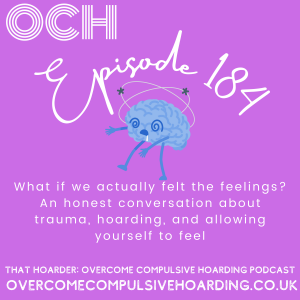
Friday May 02, 2025
Friday May 02, 2025
Come to a Dehoarding Accountability Zoom Session: http://www.overcomecompulsivehoarding.co.uk/ticket
Subscribe to the podcast: https://www.overcomecompulsivehoarding.co.uk/subscribe
Podcast show notes, links and transcript: http://www.overcomecompulsivehoarding.co.uk/
This week, I talk about what happens when I actually let myself feel the tough emotions instead of shutting them down - a pattern that's shaped my life and my struggles with hoarding, self-harm, and eating disorders. After a thought-provoking conversation with Anna Sale on Death, Sex & Money last year, I started questioning whether avoiding feelings has helped or hurt me in the long run and have been trying to process that ever since! I share what it’s like to sit with big emotions, experiment with messy ways to cope, and why feeling the feelings might just be a way forward.
Avoiding Feelings
Realisation that I tend to do anything rather than feel difficult emotions.
Recent personal reflection and processing feelings over the past few months.
Impact of mental health and a PTSD flare-up on my ability to manage feelings.
Connecting Coping Mechanisms to Avoidance
Experience with PTSD, self-harm, anorexia, and bulimia as different forms of not feeling or avoiding emotions.
Insights from an interview with Anna Sale on Death, Sex & Money that linked these coping together as forms of avoidance.
Acknowledgment that these strategies were more than just avoidance - also punitive, protective, and multifaceted.
The Cost and Pattern of Emotional Avoidance
Compartmentalising as a lifelong coping skill and its negative long-term consequences.
Difficulty breaking the habit of not feeling and the impact on my sense of identity.
Recognition that suppressing feelings can be as damaging as (or more damaging than) the feelings themselves.
Actively Facing and Processing Feelings
Engaging in therapy, journaling (both resentful and creative/collage style), and reading poetry to access emotions.
Talking more openly with friends as a supportive measure.
Forcing myself to do enjoyable activities (like getting outside), which helps counteract avoidance.
Community, Connection, and Support
Impact of Trauma and Suppression on Daily Life
How PTSD and unprocessed sadness began affecting sleep, revealing that suppressing feelings is no longer effective.
Discusses the challenge of letting oneself feel emotions, both by choice and when overcome involuntarily.
The risks of being overwhelmed and the delicate balance between feeling and avoidance.
Learning and Conversations About Emotional Acceptance
Revisiting lessons from previous podcast guests about the counterproductivity of suppressing or over-intellectualising feelings.
The concept that suppressed emotions may “come out sideways” through other behaviours, like self-harm or hoarding.
Nuanced view of coping mechanisms - not labeling them as purely negative since they served protective purposes.
Vulnerability, Shame, and Deepening Relationships
Gradual willingness to share deeper, more distressing moments with friends.
Examining the reasons behind the instinct to hide intense distress.
How vulnerability leads to stronger, more meaningful connections.
Positive Effects of Feeling the Hard Stuff
Discovering that feeling hard emotions increases the capacity to feel positive emotions more deeply.
Finding deeper love, joy, and beauty in everyday experiences.
Recognising the importance of support systems when exploring difficult emotions.
Reflection and Encouragement for Listeners
Encourages listeners to be curious about their own patterns of avoidance and coping.
Cautions that intentionally feeling emotions is difficult and requires support.
The hopeful observation that allowing feelings can be cathartic, gratifying, and healing—even if it’s uncomfortable.
Links
My interview on Death, Sex & Money
Podcast ep 182: What are “towards and away moves” and what on earth do they have to do with hoarding recovery? With Dr Jan Eppingstall
Podcast ep 169: Compassion-focused therapy for grief and hoarding with Dr Chia-Ying Chou
Podcast ep 172: Harriet Impey on clearing out her parents’ very full home, through family belongings and personal growth, in the film Where Dragons Live
Declutter Hub podcast
Come to a Dehoarding Accountability Zoom session: Accountability Booking Form
Website: Overcome Compulsive Hoarding
Become a Dehoarding Darling
Submit a topic for the podcast to cover
Questions to ask when dehoarding: https://www.overcomecompulsivehoarding.co.uk/podquestions
Instagram: @thathoarderpodcast
Twitter: @ThatHoarder
Mastodon: @ThatHoarder@mastodon.online
TikTok: @thathoarderpodcast
Facebook: Overcome Compulsive Hoarding with That Hoarder
Pinterest: That Hoarder
YouTube: Overcome Compulsive Hoarding with That Hoarder
Reddit: Overcome Compulsive Hoarding with That Hoarder subreddit
Help out: Support this project
Sponsor the podcast
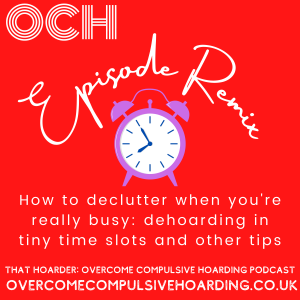
Friday Apr 25, 2025
Friday Apr 25, 2025
Come to a Dehoarding Accountability Zoom Session: http://www.overcomecompulsivehoarding.co.uk/ticket
Subscribe to the podcast: https://www.overcomecompulsivehoarding.co.uk/subscribe
Podcast show notes, links and transcript: http://www.overcomecompulsivehoarding.co.uk/
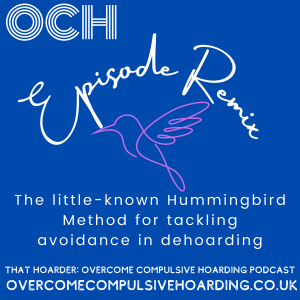
Friday Apr 18, 2025
Friday Apr 18, 2025
Come to a Dehoarding Accountability Zoom Session: http://www.overcomecompulsivehoarding.co.uk/ticket
Subscribe to the podcast: https://www.overcomecompulsivehoarding.co.uk/subscribe
Podcast show notes, links and transcript: http://www.overcomecompulsivehoarding.co.uk/
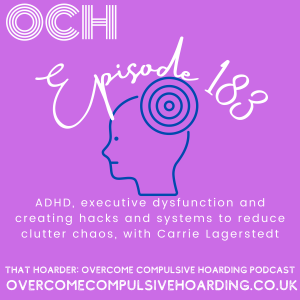
Friday Apr 11, 2025
Friday Apr 11, 2025
Come to a Dehoarding Accountability Zoom Session: http://www.overcomecompulsivehoarding.co.uk/ticket
Subscribe to the podcast: https://www.overcomecompulsivehoarding.co.uk/subscribe
Podcast show notes, links and transcript: http://www.overcomecompulsivehoarding.co.uk/
In this episode, I chat with Carrie Lagerstedt, a professional home organiser specialising in working with neurodivergent people in New Zealand. Carrie, diagnosed with ADHD herself, shares insights on managing clutter and executive dysfunction by creating home systems that work for us. We challenge the very idea of laziness and explore the potential of “may as well”.
Buy your copy at cambridge.org/EverythingHoarding, and get 20% off with the discount code HOARDING20. #ad
Carrie's background and transition from teaching to organising
Neurodivergence and Clutter
Common issues linking neurodivergence with clutter
Out of sight, out of mind
Sensory overwhelm and its effect on executive functioning
Challenges faced by those with executive dysfunction
Carrie's Experience with ADHD
Benefits of having ADHD when working with clients with similar challenges
Building trust through lived experiences and understanding
Moral neutrality and Organising
KC Davis' influence on Carrie's philosophy
Moral neutrality and functionality in organising
Debunking the concept of laziness
Challenges of living up to capitalist expectations
Systems for Neurodivergent Individuals
Making the home work for individuals
Difference between aspirational thinking and functional changes
Importance of practical systems over willpower
Executive Functioning and Organisational Strategies
Tools used to aid working memory and organisation (e.g., Post-its)
Cognitive flexibility and overcoming 'all or nothing' thinking
Understanding blocks and identifying actionable solutions
Personal Experiences and Adjustments
Personal stories and realisations regarding household tasks
Impact of habituation and changing perspectives on tasks
Tools and Hacks for Developing Systems
Categorising as key to organisation
Using visual reminders and structured systems
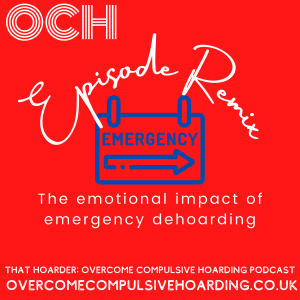
Friday Apr 04, 2025
Friday Apr 04, 2025
Come to a Dehoarding Accountability Zoom Session: http://www.overcomecompulsivehoarding.co.uk/ticket
Subscribe to the podcast: https://www.overcomecompulsivehoarding.co.uk/subscribe
Podcast show notes, links and transcript: http://www.overcomecompulsivehoarding.co.uk/









